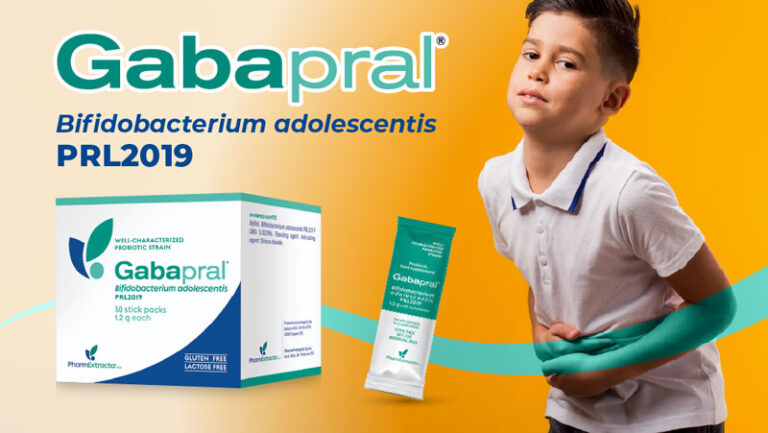
Gabapral: New Clinical Data Confirm Its Potential in Pediatric IBS
A new clinical study further supports the efficacy of Gabapral®, a precision psychobiotic containing Bifidobacterium adolescentis PRL2019, in children suffering from Irritable Bowel Syndrome (IBS) with recurrent abdominal pain. Conducted as a multicenter, randomized, double-blind, placebo-controlled trial, the study demonstrated a significant reduction in both the frequency and intensity of abdominal pain. Additionally, children receiving Gabapral® showed improved stool consistency and overall symptom remission compared to the placebo group. These findings reinforce the role of B. adolescentis PRL2019 as a GABA-producing probiotic with potential therapeutic applications in pediatric IBS.
Pediatric IBS and the Role of Gabapral®
Irritable Bowel Syndrome (IBS) is a functional gastrointestinal disorder characterized by altered bowel habits. In children, IBS is often accompanied by recurrent abdominal pain, which significantly impacts quality of life, causing physical discomfort and emotional distress for both patients and their families. In children, IBS significantly impacts quality of life, leading to physical discomfort and emotional distress for both patients and their families.
The exact causes of IBS remain unclear, but a combination of genetic, environmental, and psychological factors is thought to contribute to its development. Alterations in the gut microbiota have been observed in IBS patients, suggesting that probiotics may play a key role in symptom modulation.
Gabapral®, which contains the Bifidobacterium adolescentis PRL2019 strain, is a probiotic that produces gamma-aminobutyric acid (GABA), an inhibitory neurotransmitter involved in regulating gut motility and pain perception. This unique GABA-producing mechanism makes Gabapral® a promising candidate for managing pediatric IBS, particularly in cases involving recurrent abdominal pain.
Clinical Study Overview
A recent Italian clinical study, published in Microorganisms in March 2025 , evaluated the efficacy of Gabapral® in pediatric IBS. Led by Professor Di Nardo from the Sapienza University of Rome, the study involved 72 children, with an average age of 12 years, diagnosed with IBS according to the Rome IV criteria. The participants were randomized into two groups: one receiving Gabapral® (one stick per day for 12 weeks) and the other a placebo.
Key Findings
After 12 weeks of treatment, the results clearly indicated the clinical benefits of Gabapral®:
- Pain Reduction: Gabapral® significantly reduced both the intensity and frequency of abdominal pain, whereas no such improvement was observed in the placebo group.
- Improved Quality of Life: The “life interference” parameter, which measures the impact of IBS on daily activities such as attending school or engaging in social interactions, decreased by 57% in the Gabapral® group.
- Symptom Remission: Twice as many children in the Gabapral® group achieved complete IBS symptom remission (IBS score < 75) compared to those in the placebo group (53% vs. 19%). This remission effect became evident from the 8th week onward.
Enhanced Stool Consistency: The Bristol Stool Score analysis revealed that Gabapral® helped normalize stool consistency. The proportion of children with constipation decreased by 56%, while those with diarrhea saw a reduction of 27%.
Implications for Business Development
These findings confirm that Gabapral® represents a clinically validated option for pediatric IBS management, supporting its role as a science-backed psychobiotic. The GABA-producing B. adolescentis PRL2019 strain offers a unique mechanism of action, distinguishing Gabapral® as a premium product with its demonstrated impact on abdominal pain reduction, symptom remission, and stool normalization. As a result, Gabapral® presents a promising opportunity for companies looking to expand their probiotic offerings with a differentiated, high-value product.
